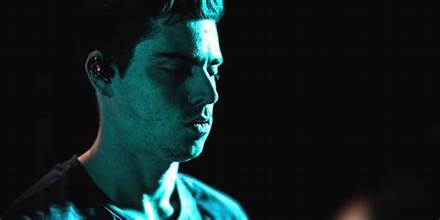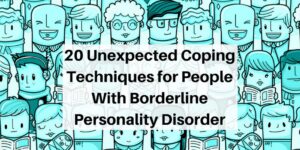The 3 Stages of My Borderline Personality Disorder Episodes
Stage 1: The Trigger
There are two ways I can write about this — the trigger before I understood what was going on and the trigger now that I know what is going on.
Before I had a diagnosis or engaged in any kind of treatment or made any kind of attempt to understand what was going on, triggers were subconscious. Imagine looking out your window. There is bright sunshine and not a cloud in the sky, and suddenly you are absolutely drenched with ice cold rain the second you walk outside your door. Imagine all the emotions that would come with that. Confusion, anger, disbelief and most important for me was that sense of injustice.
For me, triggers would be instantaneous and unpredictable and the immediacy of the intensity would catch me by complete surprise. This was pre-diagnosis. I didn’t know I was being triggered, so forget about having any kind of coping mechanisms to identify and manage those triggers.
Now imagine you’ve gone outside expecting sunshine, but you’re instantly soaked by rain — and the people you’re around haven’t been. They can’t understand your reaction as much as you can’t understand their lack of reaction. How dare they not feel what you feel? Are they all monsters? Do they not care about the situation you’re in?! I’ll speak more about the emotions involved in stage two.
Triggers are different since I’ve been diagnosed. For me, a diagnosis meant validity and responsibility. Validity that I knew I thought differently to other people and responsibility that I had a choice in how to manage these feelings. Now I am able to identify what triggers me and this is an ever-growing list. I’ve only recently (almost three years after diagnosis) realized my hyper-critical self comes out when I’m anxious about something for example — but hey, I know now. So now “the other guy” in me can be triggered and I have to remain in control to manage that trigger.
The first step for me is acknowledgment — it’s impossible to be stalked by darkness if you turn the light on. After that, I may separate the feeling from the thought. The saying goes that thoughts aren’t facts, well neither are feelings for me. It’s a work in progress to figure out when to go with my gut and when to box those feelings off. Sometimes I can trigger myself with imaginary events that haven’t even happened and I haven’t yet figured out why I do that, though I suspect it’s to do with my self-loathing and poor self-image. Maybe it’s self-sabotage. Maybe it’s a corrupted coping mechanism because life is too “normal”?
This all seems very controlled right? Easy when you know your triggers, surely? The problem with thoughts is they tend to dissolve, whereas feelings and emotions just “sit.” They stay there corroding my already fragile and unstable sense of self. The identity I am frantically trying to remember is not this twisted, disgusting, unlovable beast, but is actually an OK guy. But that emotion just gnaws away, sometimes for weeks burning through the faux veneer I’ve pathetically been trying to create. Trying to dress up in the Emperor’s new clothes until finally… sometimes… “I” happen again.
Stage 2: The Eye of the Storm
I have no better way to describe it. When I have lost control, when I have not managed that trigger, when I have been soaked through when I expected sunshine — I feel like a primal animal. All that matters is survival and protection of me because my perception of reality has become so distorted that nothing anybody says resonates with me unless it is reinforcing my own negative thought patterns.
I will verbally push away whoever has previously been supportive of me. I will treat everyone with suspicion. I may physically shake, cry, shout… even growl in solitude. I’ve had both auditory and visual hallucinations in my worst periods. There have been times I’ve self-harmed and it’s important people with no experience understand this is not a “cry for help” — I did it because it worked. As hard as that might be to read, it’s the truth as a short-term, high-risk solution. It stopped the mental pain and transferred it to physical pain and physical pain is infinitely easier to manage. I want to believe people are trying to comfort me. I want to believe people are genuine. I want to believe this episode is the anomaly rather than the reality, but when I am triggered, absolutely nothing will convince me I am anything other than a freak who doesn’t belong in the same social contract as the rest of humanity.
At the very worst, I will dissociate involuntarily. And while this removes me from feeling and needing to manage the emotional explosion, it unleashes the other thing in me that uses up all my chances in my friendships. I say that because surely, at some point, people will say enough is enough and at that point, the “other me” will comfort me and remind me he was right all along. He wasn’t of course, I just couldn’t control him. The price of dissociation is a complete freedom for every maladjusted emotional reaction. I can see this happening, but I can’t stop it. I don’t know what stops it but something must. This is the stage I liken to the Incredible Hulk when Bruce Banner gets in an uncontrollable rage, devoid of guilt, intent on destroying anything around him. When the rage subsides, the Hulk fades away and he awakes dazed and confused back as Bruce Banner once more.
Stage 3: The Aftermath
No more racing thoughts for an hour or two. It’s like my inner world has reset and it’s a blank slate until something reminds it how I process things. Literally an hour or two respite from existence before the clock starts ticking to the next stage two and I begin to manage the triggers once more.
If dissociation is the exhilarating liberation from the intensity of my borderline emotional state as a means of self-preservation, then the reattachment to society is equally painful. Sounds are too loud, lights are too bright. I struggle to see people interact, even strangers. I don’t understand the rules of the world where they have this connection and I don’t. Where they can have this connection and I can’t. All these things feel like they physically hurt and then I feel conflicted by the knowledge that they can’t physically be hurting me… so what’s wrong with me?
Guilt.
Regret.
Remorse.
Anxiety.
Self-loathing.
These charge back into my consciousness like a thousand wild horses rampaging through budding farmland, stomping on any signs of inner peace I felt for those blissful few minutes. I would give anything to believe that short time could be my constant mental state. I experience guilt, regret, remorse and self-loathing either due to the behavior I am ashamed of or the result of debilitating anxiety over what I know I’m capable of, but have no recollection of. Such is the intensity of BPD, anything I feel here is amplified and I know this… I just don’t feel this.
I can’t watch TV because I attach to the fictional emotional states in such a way that it’s too painful to watch or because I attach to the fictional characters in a way that isn’t healthy. I can listen to music and be in tears thanks to my attachment to the lyrics or the memories the songs trigger. That’s the intensity, the hyper-intensity in stage three, before I settle down back to normality and re-enter stage one. That just leaves me with sleep and sleep becomes a favorite pastime. My bedtimes become earlier and earlier until my body just isn’t tired so now I just lay there, unable to entertain myself or relax. I see this as a positive sign now that I’m past the initial stages of reattachment which are the most painful for me.
None of this excuses the cycle. Yes I understand it, but I would hate if people thought I saw this understanding as an excuse. I don’t want to have these cycles. I am confused and frustrated that other people can see when I’m in stage one and I can’t. I’m even more frustrated when I can see I’m in stage one yet still progress to stage two. Amid this intensity, I am also intensely grateful for people who accept this about me and still stick by me. Those people who see the good in me when I struggle to. Those people who simply ask, “Are you OK?” when they see stage one and I don’t. Those people who contact me in stage three or allow me to be quiet if that’s what I need. Thank you.













Be First to Comment